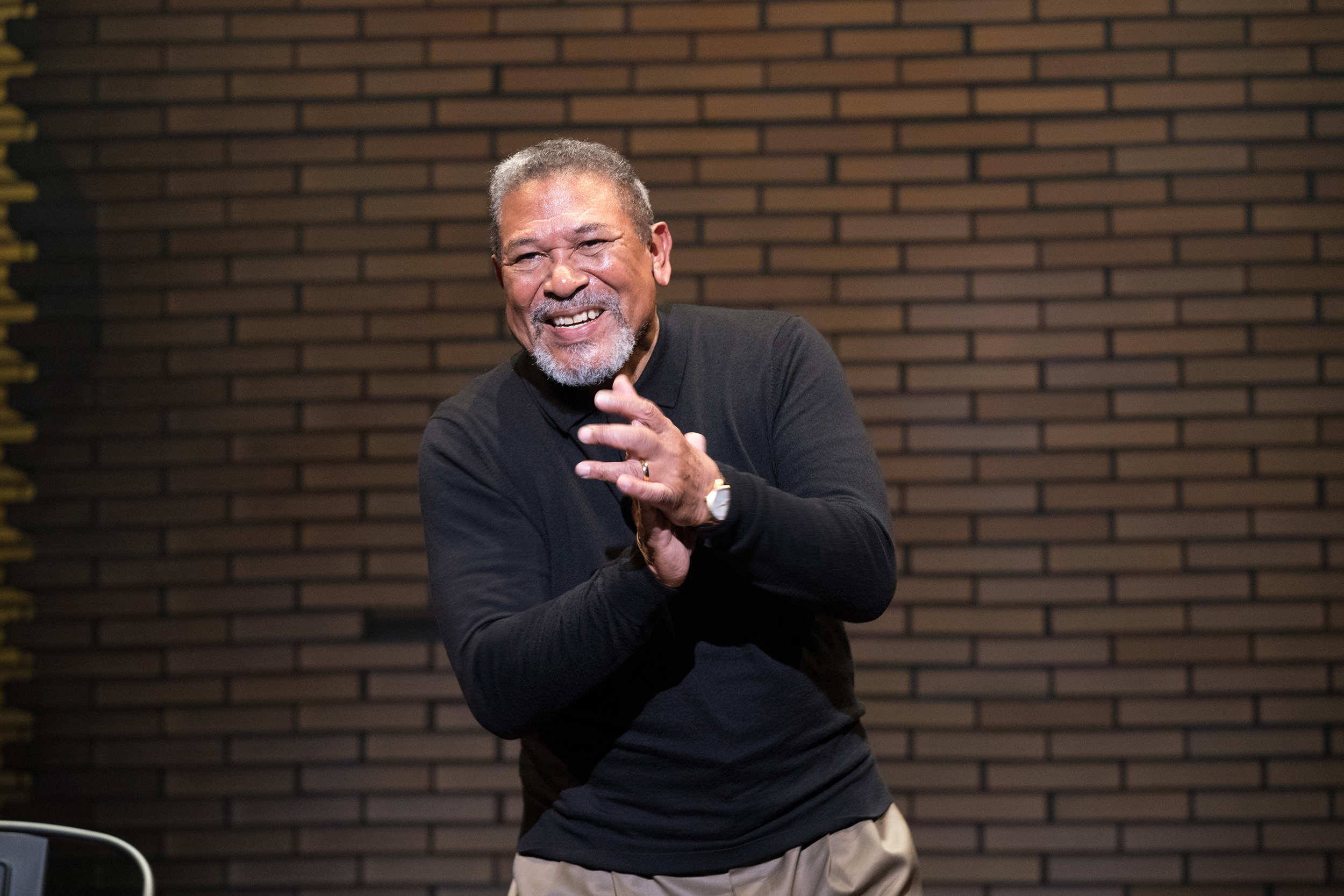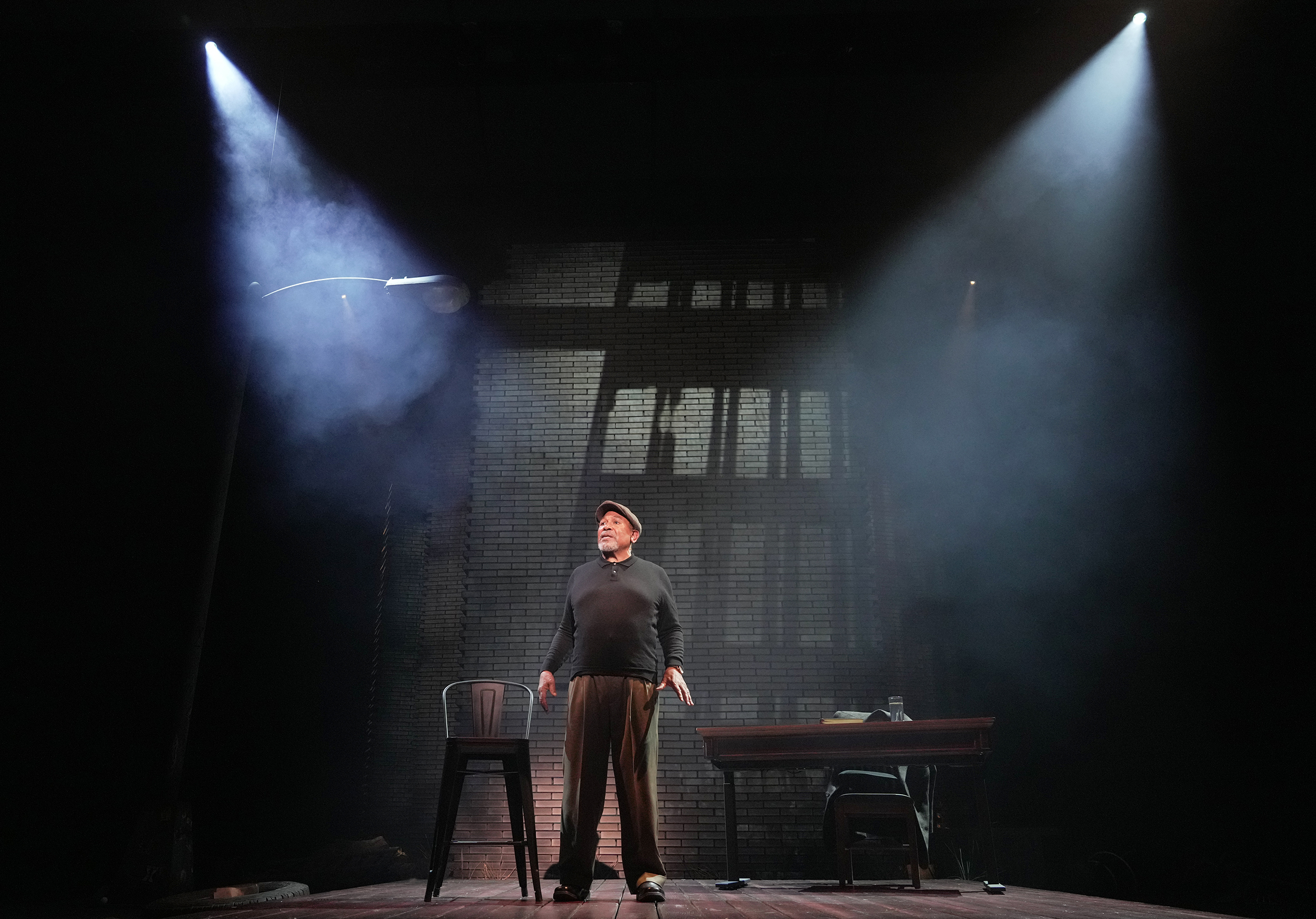A Vivid Portrait of a Playwright
Review of How I Learned What I Learned at Seattle Rep
Written by Teen Writer Daphne Bunker and edited by Aamina Mughal

The Oregon Shakespeare Festival’s production of August Wilson’s How I Learned What I Learned at the Seattle Rep is a striking one-man show from the moment the Rep’s spacious yet intimate space darkens. It’s then that performer Steven Anthony Jones, in the role of playwright and poet August Wilson himself, walks through the aisle under a spotlight and up the stairs to the stage. On the stage are clusters of grass and stones, a street light, a desk with a glass of water, two chairs, and a formation of brick wall set pieces. On the foremost wall, white serifed letters are projected, reading “How I Learned What I Learned (And How What I Learned Has Led Me To Places I’ve Wanted to Go. That I Have Sometimes Gone Unwillingly is the Crucible in Which Many a Work of Art Has Been Fired).”
Jones, as Wilson, finishes his ascent and stands beneath the words projected on the bricks. He stands still in the silence before he begins speaking, his voice sounding through the theater with the strength and conviction of a storyteller with something to say. From these first moments, How I Learned What I Learned makes it clear that it is not simply an extended monologue; it’s a back-and-forth between performer, script, and audience, in which Jones brings the intricacies of Wilson’s writing to the theater, and the audience responds with rapt attention.

August Wilson’s script is a self-portrait as a short story collection. It traverses Wilson’s life through a chain of anecdotes, recounting lessons Wilson has gained from his experiences. The stories encompass what it means to be Black in America, what it means to be an artist with ambition, what it means to be a friend or lover, and above all, what it means to demand that the world treats you with dignity and respect. Throughout these themes, Wilson’s words are powerfully pensive, sharply funny, passionately poetic, and endlessly complex. Though the show is comprised of two hours of anecdotes from Wilson’s entire life, its range is far-reaching and the selection of stories really encapsulates who Wilson was as a person.
The scenic design, by Nina Ball, evokes hominess, like the feeling of a front porch, framing Wilson as if he was putting on a show for his neighbors which furthers the connection between performer and audience. Behind Wilson on the brick wall, the projected text complements the structure of the show by changing with each new story to state the title. Each new letter echoes with a typewriter clack, and together these visual and auditory cues keep the show moving at an easy-to-follow pace and on its promised trajectory. The physical set pieces and the technical elements work in harmony, providing a fitting space for Wilson and the audience to occupy, the physical set providing the atmosphere and the technical elements providing an explicit structure for an otherwise freeform play.
As the show moves along, Steven Anthony Jones shows he is a master of the script. From anecdote to anecdote, he performs with a captivating stage presence and carries the two-hour show with unwavering wit and humor. In the stories of Wilson’s follies and comedic mistakes, reminiscent of a standup special, he pulls the audience in with perfectly timed delivery. In the stories of heightened emotion, from elation to terror to indignation, he embodies his character with such certainty and undeniable skill it’s easy to forget the one-man show is scripted. In the stories in which Wilson recounts hard-learned lessons in the play’s keenly poetic dialogue, Jones utterly commands the space. His voice pierces the theater, and in the space between his words, the audience is silent, simply listening. To seamlessly form a connection with an audience that has them humming in agreement at one line and laughing at the next is a feat, and he is a pleasure to watch through it all.

August Wilson first performed How I Learned What I Learned at Seattle Rep twenty years ago, in the same theater space he worked on much of his American Century Cycle (see here). In the Oregon Shakespeare Festival’s production, Wilson’s artistry continues to shine through every word, conveying his skill as a storyteller even after someone else has taken on his role. Wilson’s script is the kind of work you want to listen to at least three times: once to soak in the truth of what he’s saying, another time to examine the technique of his poeticism, and a third time because it’s simply that good. The staging is inventive and creates an environment for How I Learned What I Learned that enhances the show’s inviting atmosphere while keeping the pacing tight. Most notably, Steven Anthony Jones assumes the role of Wilson and carries the play with an ease and masterful back-and-forth with the audience even as he is the only person speaking the entire runtime. He takes the play from technical work of art to a captivating theater experience, performing August Wilson’s one-man show with unforgettable acuity and humor.
How I Learned What I Learned took place at Seattle Rep on April 21 - May 14, 2023. For more information see here.
Lead Photo: Steven Anthony Jones in August Wilson’s How I Learned What I Learned at Oregon Shakespeare Festival. Photo by Jenny Graham.
The TeenTix Newsroom is a group of teen writers led by the Teen Editorial Staff. For each review, Newsroom writers work individually with a teen editor to polish their writing for publication. The Teen Editorial Staff is made up of 6 teens who curate the review portion of the TeenTix blog. More information about the Teen Editorial Staff can be found HERE.
The TeenTix Press Corps promotes critical thinking, communication, and information literacy through criticism and journalism practice for teens. For more information about the Press Corps program see HERE.


